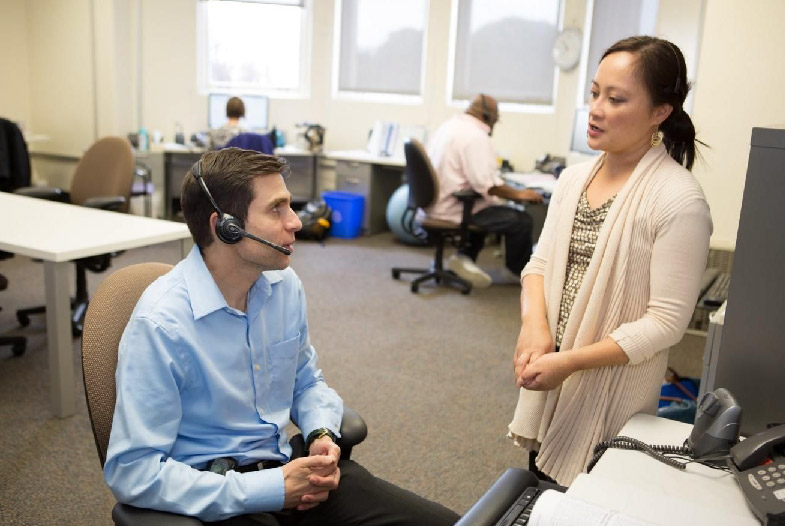A Hotel Housekeeper, A Needle Stick, A Hepatitis C Diagnosis: Case Study from the Clinician Consultation Center

By Carolyn Chu, MD, MSc, Clinical Director of the Clinician Consultation Center
[Editor’s Note: This guest blog post comes to us from Carolyn Chu, MD, MSc, Clinical Director of the Clinician Consultation Center (CCC). Funded by the Health Resources and Services Administration (HRSA) and based out of University of California, San Francisco’s Department of Family and Community Medicine, the CCC has been providing consultation and education resources to health care providers across the US for over 25 years. Every year, they provide roughly 17,000 telephone‐based consultations -- cost-free and confidential -- to clinicians via their HIV Warmline, Substance Use Warmline, HEPline, PrEPline, and Perinatal HIV Hotline. Here, Dr. Chu illustrates a recent call to the PEPline, a warmline for clinicians to call for advice on occupational bloodborne pathogen exposure. Calls are fielded by a multidisciplinary clinical team of advanced practice nurses, pharmacists and physicians. See the bottom of this post to learn more about CCC and access their services.]
A provider called the PEPline to discuss baseline testing results regarding a 58-year-old woman who works in housekeeping services at a local hotel. The patient was evaluated last week after being stuck with a needle that had been discarded by an unknown individual in one of the hotel’s guest rooms. Baseline labs were drawn a few hours after the incident occurred, and the employee’s HCV antibody result came back as reactive. The reference lab was able to run a “reflex” hepatitis C RNA (viral load) off the same sample and this was reported as 5,913,385 IU/mL. The caller wanted to confirm if this meant the employee acquired hepatitis C from the needle stick. The housekeeper did not recall any other incidents of a similar nature during her current or former employment, and reported no previous history of hepatitis C screening or testing.

photo by Elisabeth Fall
The CCC consultant clarified that these results should not be attributed to the recent needle stick. Rather, they likely represented established hepatitis C infection. Without having prior testing or laboratory results to compare these recent results to, it would be difficult to definitively establish the timing of infection. The patient’s age puts her in the “birth cohort”: individuals born between 1945 and 1965 have elevated rates of hepatitis C, and the CDC and multiple other organizations recommend screening in this population, regardless of country of birth. The CCC consultant advised the caller to also inquire about risk behaviors and other exposures such as possible exposures in unregulated settings (domestic and international), injection drug use, etc.
Finally, the consultant shared details on additional testing that should be performed to help with hepatitis C pre-treatment evaluation, including screening for other co-infections such as HIV and hepatitis B and assessment of fibrosis/cirrhosis. Most importantly, the patient should be connected to a provider, ideally someone with hepatitis C experience, who can help guide the patient through the next steps of decision-making, namely interest in (and readiness for) starting hepatitis C treatment. Currently favored direct-acting antiviral medications are highly effective, well tolerated, and can cure hepatitis C after just a few months. Scaling up and improving widespread roll-out of hepatitis C treatment is also cost effective: as stated in the AASLD guidelines, “[direct-acting antiviral] regimens provide good value for the resources invested”. In 2016, the World Health Organization adopted the first-ever global hepatitis strategy: target goals for 2030 include a combined 90 percent reduction in new cases of hepatitis B and C, and 65 percent reduction in deaths attributed to these conditions. This strategy has been adapted for national, state, and regional/local hepatitis “elimination” plans, and many health centers have implemented workforce capacity-building and program development initiatives to help increase access to hepatitis C care and treatment.
To reach a CCC consultant regarding hepatitis C treatment, call 844-HEP-INFO (844-437-4636) 9am-8pm ET, Monday-Friday (or submit a case inquiry online:
http://nccc.ucsf.edu/clinician-consultation/hepatitis-c-management/
To reach a CCC consultant regarding possible occupational bloodborne pathogen exposure, call the PEPline at 888-448-4911 seven days week, 11am-8pm ET.
For additional information on how to reach an HIV and/or substance use expert consultant, go to: nccc.ucsf.edu. All CCC consultations are free of cost and confidential.
References and select educational resources for health care providers:
Information for healthcare personnel potentially exposed to hepatitis C virus (HCV). U.S. Department of Health and Human Services/Centers for Disease Control and Prevention, April 2018. Accessed February 5, 2019: https://www.cdc.gov/hepatitis/pdfs/testing-followup-exposed-hc-personnel.pdf
HCV guidance: recommendations for testing, managing, and treating hepatitis C. Infectious Diseases Society of America/American Association for the Study of Liver Disease. Accessed February 5, 2019: https://www.hcvguidelines.org/
Testing recommendations for hepatitis C virus infection. Centers for Disease Control and Prevention. Accessed February 5, 2019: https://www.cdc.gov/hepatitis/hcv/guidelinesc.htm
Hepatitis C: screening. U.S. Preventive Services Task Force. Accessed February 5, 2019: https://www.uspreventiveservicestaskforce.org/Page/Document/UpdateSummaryFinal/hepatitis-c-screening
Global health sector strategy on viral hepatitis, 2016-2021: towards ending viral hepatitis. World Health Organization, June 2016. Accessed February 5, 2019:
https://www.who.int/hepatitis/strategy2016-2021/ghss-hep/en/
Hepatitis C Online. University of Washington. Accessed February 5. 2019: https://www.hepatitisc.uw.edu/
AIDS Education & Training Center Program National Coordinating Resource Center. Accessed February 5, 2019: https://aidsetc.org/resources
This project is supported by the Health Resources and Services Administration (HRSA) of the U.S. Department of Health and Human Services (HHS) under grant number U1OHA30039-03-01 (AIDS Education and Training Centers National Clinician Consultation Center) awarded to the University of California, San Francisco.
Like what you see? Amplify our collective voice with a contribution.
Got some good news to share? Contact us on our social media pages above.
Return to the main blog page or sign up for blog updates here.
- Log in to post comments
